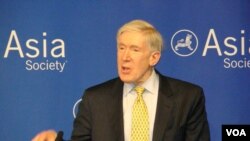“[The United States and China are] on the verge of a new era in our bilateral economic relationship,” said U.S. Under Secretary of State for Economic Growth, Energy, and the Environment Robert Hormats. “One when we can explore new possibilities for mutual benefit and win-win cooperation.”
Following the elections in the United States and political transition in China, both countries now face many compelling priorities, mainly internal in nature – jobs, economic growth, the environment, social equity – that require imaginative and innovative solutions.
“We must find ways to ensure that U.S.-China relations support these internal objectives in both countries, and that one side does not seek to accomplish them at the other’s expense,” said Under Secretary Hormats.
These include encouraging China to maintain a policy environment for innovation that respects intellectual property rights and trade secrets; collaborating on the environment, clean water, and climate change by fostering exchanges of scientists and policymakers; working together to increase Chinese investment in the United States; improving linkages between American and Chinese small- and medium-sized enterprises; ramping up agricultural trade; and cooperating on product safety and financial sector reform, as well as encouraging service sector opening that will lead to a more consumption-driven economy where U.S. firms can play a role.
The United States and China share a mutual interest to bring together Chinese and American governors and provincial and municipal leaders to collaborate on economic, energy, and environmental issues, which can provide mutual benefits, including boosting American exports to China; providing Chinese consumers access to U.S. services and education; promoting scientific exchanges, and encouraging Chinese investment in the United States.
“Much of the future of the world in the 21st Century will depend on how well China and the United States sustain growth in our own economies, manage our relationship with one another, and together address challenges facing the global economy,” said Under Secretary Hormats. “If we can successfully strengthen this evermore complex and important relationship, both countries will be better for it.”
Following the elections in the United States and political transition in China, both countries now face many compelling priorities, mainly internal in nature – jobs, economic growth, the environment, social equity – that require imaginative and innovative solutions.
“We must find ways to ensure that U.S.-China relations support these internal objectives in both countries, and that one side does not seek to accomplish them at the other’s expense,” said Under Secretary Hormats.
These include encouraging China to maintain a policy environment for innovation that respects intellectual property rights and trade secrets; collaborating on the environment, clean water, and climate change by fostering exchanges of scientists and policymakers; working together to increase Chinese investment in the United States; improving linkages between American and Chinese small- and medium-sized enterprises; ramping up agricultural trade; and cooperating on product safety and financial sector reform, as well as encouraging service sector opening that will lead to a more consumption-driven economy where U.S. firms can play a role.
The United States and China share a mutual interest to bring together Chinese and American governors and provincial and municipal leaders to collaborate on economic, energy, and environmental issues, which can provide mutual benefits, including boosting American exports to China; providing Chinese consumers access to U.S. services and education; promoting scientific exchanges, and encouraging Chinese investment in the United States.
“Much of the future of the world in the 21st Century will depend on how well China and the United States sustain growth in our own economies, manage our relationship with one another, and together address challenges facing the global economy,” said Under Secretary Hormats. “If we can successfully strengthen this evermore complex and important relationship, both countries will be better for it.”






